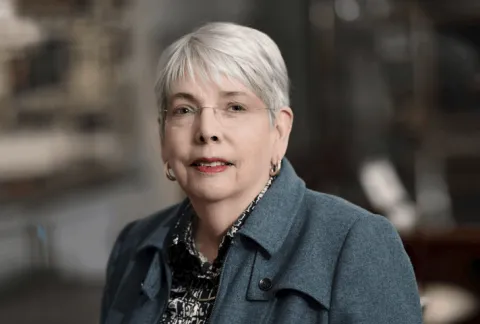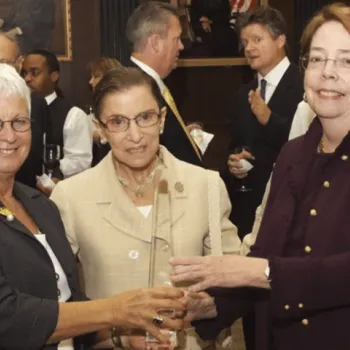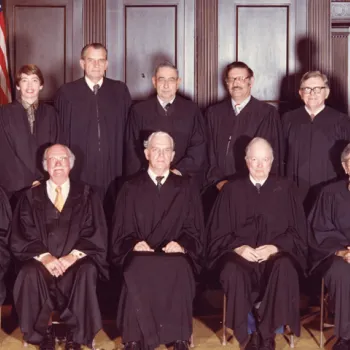By her own admission, Carolyn Dineen King, who in 1979 joined a historic class of 23 women jurists, was not committed to being a lawyer when she entered law school in 1959.
That changed two years later, when King became “addicted” to the law during a summer job in Washington. She achieved a thriving career as a corporate lawyer, a life she loved so much that she hesitated before accepting an appointment to the U.S. Court of Appeals for the Fifth Circuit. Once on the bench, King emerged as an exemplary judicial leader—in 2007 receiving the Devitt Award, one of the most prestigious honors available to a federal judge.
“First and foremost, I have always been a lawyer,” King said of her career. “As a judge, there’s lots of law for you to sink your teeth into. I started out a reluctant judge, but I became an enthusiast in due course.”
In the years following World War II, King’s parents, who both had worked as lawyers, paid little attention to prevailing social messages that women should get married and stay at home. “The main thing that got drilled into me from my earliest memory was, ‘Do not be dependent on anyone to support you,’” King said.

Judge Carolyn Dineen King. Photo courtesy of Judge King.
As an undergraduate at Smith College in Massachusetts, King toyed with, but abandoned, a possible career as a philosophy professor. As a fall-back, she successfully enrolled in Yale Law School.
King’s ambitions came into focus in 1961, when she took a summer fellowship with the Tax Division of the Department of Justice. The civil rights movement had inspired the entire department, led by Attorney General Robert F. Kennedy, King recalled.
“The summer may have made more of a difference for the rest of my life than almost anything else,” she said. “The entire Department of Justice was completely filled with the spirit of participating in this major change in this country. That made an enormous impression on me.”
After moving to Houston, King quickly rose as a corporate lawyer at major law firm. Long before such hours became the norm, she averaged 2,500 to 3,000 hours a year, handling mergers and acquisitions. Also ahead of her time, King returned to work shortly after each of her three children was born.
Despite the era’s social conservatism, King never heard a whisper of sexism from her clients, and on the surface, everything was fine within her law firm. “They paid me very well,” King said.
Then in 1970, a senior partner visited King shortly after the birth of her second child. “We sat in the living room, and he said to me out of the blue, ‘You are not going to make partner.’ ”
King was stunned. She told the partner she didn’t believe him, that she would be rewarded for hard work. Two years later, when King came due for partnership, she was rejected.
“It was absolutely devastating. I quit right on the spot,” King said. “I had spent 10 years of my life completely committed to the law firm, but they were operating on the unspoken premise that I eventually was going to have a baby and leave, and obviously I wasn’t going to make partner.”
King soon was hired by another Houston firm, and she was ready to spend the rest of her career as a corporate lawyer. Then in 1979, the ultimate career change came looking for her.
President Carter was hoping to appoint a woman to the Fifth Circuit, and King’s name had risen to the top. Her first thought? “Why would I want to do that? I like what I’m doing,” King recalled. But her husband persuaded her to apply. Even when she did so, King thought she would serve on the bench only a few years, before returning to corporate law.
Among the future judges at her confirmation hearing was Thomas M. Reavley, who along with King was confirmed to the Fifth Circuit. Twenty-five years later, in 2004, after Reavley’s wife of 60 years passed away, he and King were married.
“He and I started a romance, which was sort of surprising, but it all worked out,” King said. “We share so many common interests. We’re both of us lawyers to our core. But also it’s been a wonderful marriage and a wonderful romance. He’s a remarkable man.”
In 1999, King became the Fifth Circuit’s chief judge, which also granted her a seat on the Judicial Conference of the United States. As chief judge, and later as the first woman to serve as chair of the Judicial Conference’s Executive Committee, King plunged into three immense, but critical, administrative challenges.
Recognizing that federal judges and courthouses along the Texas-Mexico border were becoming overwhelmed by criminal and immigration cases, King worked with the Ninth and Tenth Circuits, which had similar problems. After the circuits raised attention about the border courts, the Judiciary obtained new judgeships, as well as funding to modernize existing courthouses and build new ones.
In March 2004, federal courts were forced to address escalating costs. Chief Justice William Rehnquist authorized the Executive Committee to lead a national cost containment initiative. Working with Judiciary committees, chief judges and court unit executives, King presented a far-reaching, national cost-containment plan to the Judicial Conference just six months later. It passed unanimously.
“From that point on, our ability to get what we needed from Congress was greatly enhanced,” she said, “because they recognized we were good stewards.”
King also fast-tracked an initiative in the Fifth Circuit to ensure that district courts in Louisiana, Mississippi, and Texas all had plans to cope with a major hurricane or other emergency.
In 2005, when Hurricane Katrina devastated New Orleans, home base of the Fifth Circuit, more than 90 court employees, and their families, were relocated to Houston. The courts resumed operations, but King and her staff continued to wrestle with the lingering human impact.
Read the Series
This is the tenth and final part in a series of articles about 23 women judges who in 1979 reshaped the federal Judiciary.
“Some of these people lost family members. We had to do a lot to lift people’s spirits,” King said. “We had to find schools for all their children. But there was an esprit de corps that you might not have anticipated from all the tragedy that was unfolding in New Orleans.”
In 2007, King received the Edward J. Devitt Distinguished Service to Justice Award. In a nominating letter, then-Chief Judge Michael Boudin of the First Circuit wrote: “Judge King has been an outstanding chief judge of her own circuit, almost legendary in her devotion to its needs. In her leadership of the Executive Committee … she has been the single most important figure in the Judiciary in guiding the courts through the financial crisis of the last several years.”
King said she has mixed feelings about the award.
“It felt strange because everything I had done for this court, and the court system generally, has been a community effort,” she said. “The Devitt Award recognized effort on my part, but it wasn’t just me by a long shot. There were so many people who worked for the good of the order. They all should have gotten it.”
Though she was part of a historic class of women judges, King at first only fleetingly realized the significance of their appointments—when a number of new women judges posed for a photo with Chief Justice Warren Burger. Today, however, she is pleased that the makeup of the federal courts has changed since 1979.
“You’ve got to feel good about that,” King said. “It strengthens the whole organization to have a wide variety of women and men who are owners of this business. Each of us brings something unique to this collective enterprise.”
Subscribe to News Updates
Subscribe to be notified when the news section is updated.


